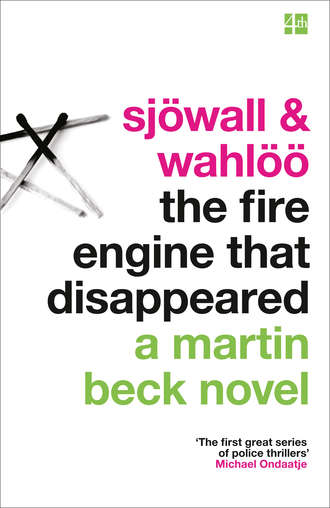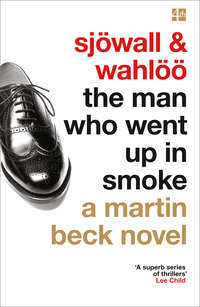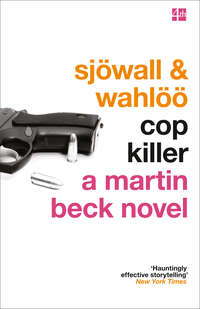
Полная версия
The Fire Engine That Disappeared
He took a deep breath and returned to the flat, tore down the blind on the other window and smashed the windows with a chair. The smoke lifted slightly, but above him the ceiling was now bulging and orange tongues of flame were beginning to appear around the hall door. It did not take him more than fifteen seconds to find the man. He had not managed to get out of bed, but he was alive and was coughing weakly and pitifully.
Gunvald whipped off the blanket, slung the old man over his shoulder, carried him right across the room and climbed out in a cascade of falling sparks. He coughed hoarsely and could hardly see for the blood running down from the wound in his forehead, mixing with the sweat and tears.
With the old man still over his shoulder, he dragged the old woman away and laid them both down beside each other on the ground. Then he examined the woman to see if she was breathing. She was. He hauled off his sheepskin coat and brushed a few sparks off it. Then he used it to cover the naked girl, who was still screaming hysterically, and led her away to the others. He took off his tweed jacket and swept that around the two small children, and gave his woollen scarf to the naked man, who at once wound it round his hips. Finally he went over to the red-haired woman, lifted her up and carried her over to the assembly place. She smelled revolting and her screams cut to the quick.
He looked over at the house, which was now blazing all over, burning wildly and uninhibitedly. Several private cars had stopped near the road and bewildered people were just getting out of them. He ignored them. Instead he took off his ruined fur cap and pressed it down over the forehead of the woman in the nightgown. He repeated the question he had put to her a few minutes earlier:
‘Haven’t you got another child?’
‘Yes…Kristina…her room’s in the attic.’
Then the woman started weeping uncontrollably.
Gunvald Larsson nodded.
Bloodstained, soot-streaked, drenched with sweat and his clothes torn, he stood among these hysterical, shocked, screaming, unconscious, weeping and dying people. As if on a battlefield.
Above the roar of the fire came the primeval wail of the sirens.
And then suddenly everyone came at once. Water tankers, fire ladders, fire engines, police cars, ambulances, motorcycle police, and fire brigade officers in red saloon cars.
Zachrisson.
Who said: ‘What…how did it happen?’
And at that moment the roof fell in and the house was transformed into a cheerfully crackling beacon.
Gunvald Larsson looked at his watch. Sixteen minutes had gone by since he had stood, frozen, up on that hill.
4
On the afternoon of Friday, the eighth of March, Gunvald Larsson was sitting in a room at the police station in Kungsholmsgatan. He was wearing a white polo sweater and a pale grey suit with slanting pockets. Both hands were bandaged and the bandage around his head reminded him very strongly of the popular picture of General von Döbeln during the battle of Jutas in Finland. He also had two bandage patches on his face and neck. Some of his brushed-back fair hair had been singed away, as had his eyebrows, but his clear blue eyes looked just as blank and discontented as ever.
There were several other people in the room.
For instance, Martin Beck and Kollberg, who had been called there from the Murder Squad in Västberga, and Evald Hammar who was their superintendent and until further notice considered responsible for the investigation. Hammar was a large, heavily built man and his thick mane of hair had by now turned almost white in the course of duty. He had already begun to count the days until he retired, and regarded every serious crime of violence as persecution of himself personally.
‘Where are the others?’ asked Martin Beck.
As usual, he was standing to one side, fairly near the door, leaning with his right elbow against a filing cabinet.
‘What others?’ asked Hammar, well aware of the fact that the composition of the investigation team was entirely his affair. He had sufficient influence to be able to second any individual member of the force he wanted and was used to working with.
‘Rönn and Melander,’ said Martin Beck stoically.
‘Rönn is at South Hospital and Melander at the scene of the fire,’ said Hammar shortly.
The evening papers lay spread out over the desk in front of Gunvald Larsson and he was rustling angrily among them with his bandaged hands.
‘Damned hacks,’ he said, shoving one of the papers over towards Martin Beck. ‘Just look at that picture.’
The picture took up three columns and portrayed a young man in a trench coat and a narrow-brimmed hat, a troubled look on his face, standing poking with a stick in the still-smoking ruins of the house in Sköldgatan. Diagonally behind him, in the left-hand corner of the picture, stood Gunvald Larsson, staring foolishly into the camera.
‘You perhaps don’t come out to your best advantage,’ said Martin Beck. ‘Who’s the guy with the walking stick?’
‘His name is Zachrisson. A rookie from the Second District. Absolute idiot. Read the caption.’
Martin Beck read the caption.
The hero of the day, Inspector Gunwald Larsson (r) made a heroic contribution during last night’s fire by saving several people’s lives. Here he can be seen examining the remains of the house, which was totally destroyed.
‘Not only do the blasted bunglers not even know the difference between right and left,’ mumbled Gunvald Larsson, ‘but they…’
He did not say anything more, but Martin Beck knew what he meant, and nodded thoughtfully to himself. The name was spelled wrong too. Gunvald Larsson looked at the picture with distaste and pushed the paper away with his arm.
‘And I look moronic too,’ he said.
‘There are drawbacks to being famous,’ said Martin Beck.
Against his will, Kollberg, who detested Gunvald Larsson, squinted down at the scattered newspapers. All the pictures were equally misleading and every front page was decorated with Gunvald Larsson’s staring eyes underneath glaring headlines.
Heroic deeds and heroes and God knows what else, thought Kollberg, sighing dejectedly. He was sitting hunched up in a chair, fat and flabby, his elbows on the desk.
‘So we find ourselves in the strange position of not knowing what happened?’ said Hammar severely.
‘Not all that strange,’ said Kollberg. ‘I personally hardly ever know what’s happened.’
Hammar looked critically at him and said:
‘I mean we don’t know whether the fire was arson or not.’
‘Why should it be arson?’ asked Kollberg.
‘Optimist,’ said Martin Beck.
‘’Course it was bloody well arson,’ said Gunvald Larsson. ‘The house blew up practically right in front of my nose.’
‘And are you certain the fire began in this man Malm’s room?’
‘Yes. As good as.’
‘How long had you had the house under observation?’
‘About half an hour. Personally. And before that, that fathead Zachrisson was there. Hell of a lot of questions, by the way.’
Martin Beck massaged the bridge of his nose between his right-hand thumb and forefinger. Then he said:
‘And are you certain no one went in or out during that time?’
‘Yes, I’m damned sure of that. What happened before I went there, I don’t know. Zachrisson said that three people had gone in and no one had come out.’
‘Can one rely on that?’
‘Don’t think so. He seems unusually dumb.’
‘You don’t mean that, do you?’
Gunvald Larsson looked angrily at him and said:
‘What the hell’s all this about anyway? I’m standing there and the miserable house catches fire. Eleven people were trapped inside and I got eight of them out.’
‘Yes, I’ve noticed that,’ said Kollberg, glancing sideways at the newspapers.
‘Is it quite certain that it is a question of only three people killed in the fire?’ Hammar asked.
Martin Beck took some papers out of his inside pocket and studied them. Then he said:
‘It seems so. That man Malm, another called Kenneth Roth who lived above Malm, and then Kristina Modig, who had a room in the attic. She was only fourteen.’
‘Why did she live in the attic?’ asked Hammar.
‘Don’t know,’ said Martin Beck. ‘We’ll have to find that out.’
‘There’s a hell of a lot more we’ve got to find out,’ said Kollberg. ‘We don’t even know that it was just those three who were killed. And also, all that about eleven people is just a supposition, isn’t it, Mr Larsson?’
‘Who were the people who got themselves out, then?’ said Hammar.
‘First of all, they didn’t get themselves out,’ said Gunvald Larsson. ‘I was the one who got them out. If I hadn’t happened to have been standing there, not a damned one of them would have got clear. And second, I didn’t write down their names. I had other things to do at the time.’
Martin Beck looked thoughtfully at the big man in bandages. Gunvald Larsson often behaved badly, but to be offensive to Hammar must be due to either megalomania or a stroke. Hammar frowned.
Martin Beck shuffled through his papers and said as a diversion:
‘I’ve at least got the names here. Agnes and Herman Söderberg. They are married, sixty-eight and sixty-seven years old. Anna-Kajsa Modig and her two children, Kent and Clary. The mother is thirty, the boy five and the girl seven months. Then two women, Clara Berggren and Madeleine Olsen, sixteen and twenty-four, and a guy called Max Karlsson. How old he is, I don’t know. The last three didn’t live in the house, but were there as guests. Probably at Kenneth Roth’s, the one who was killed in the fire.’
‘None of those names means anything to me,’ said Hammar.
‘Nor me,’ said Martin Beck.
Kollberg shrugged his shoulders.
‘Roth was a thief,’ said Gunvald Larsson. ‘And Söderberg a drunk and Anna-Kajsa Modig a whore. If that makes you any happier.’
A telephone rang and Kollberg answered. He pulled a notepad towards him and took a ballpoint pen out of his pocket.
‘Oh, yes, it’s you is it? Yes, get going.’
The others watched him in silence. Kollberg put down the receiver and said:
‘That was Rönn. This is the position: Madeleine Olsen probably won’t survive. She’s got eighty per cent burns plus concussion and a multiple fracture of the femur.’
‘She was red-haired all over,’ said Gunvald Larsson.
Kollberg looked sharply at him and went on:
‘Old man Söderberg and his wife are suffering smoke poisoning, but their chances are passable. Max Karlsson has thirty per cent burns and will live. Carla Berggren and Anna-Kajsa Modig are physically uninjured, but both are suffering from severe shock, as is Karlsson. None of them is fit to be interrogated. Only the two kids are perfectly all right.’
‘So it might be an ordinary fire, then,’ said Hammar.
‘Balls,’ said Gunvald Larsson.
‘Shouldn’t you go home to bed?’ said Martin Beck.
‘You’d like that, wouldn’t you, eh?’
Ten minutes later, Rönn himself appeared. He goggled at Larsson in astonishment and said:
‘What in the world are you doing here?’
‘You may well ask,’ said Gunvald Larsson.
Rönn looked reproachfully at the others.
‘Have you lost your minds?’ he said. ‘Come on, Gunvald, let’s go.’
Gunvald rose obediently and walked over to the door.
‘One moment,’ said Martin Beck. ‘Just one question. Why were you shadowing Göran Malm?’
‘Haven’t the slightest idea,’ said Gunvald Larsson, and left.
An astonished silence reigned.
A few minutes later, Hammar grunted something incomprehensible and left the room. Martin Beck sat down, picked up a newspaper and began reading it. Thirty seconds later, Kollberg followed his example. They sat like this, in sullen silence, until Rönn returned.
‘What did you do with him?’ said Kollberg. ‘Take him to the zoo?’
‘What d’you mean,’ said Rönn, ‘do with him? Who?’
‘Mr Larsson,’ said Kollberg.
‘If you mean Gunvald, he’s in South Hospital with concussion. He is not allowed to speak or read for several days. And whose fault is that?’
‘Well, not mine,’ said Kollberg.
‘Yes, that’s just what it is. I’ve a damned good mind to punch you.’
‘Don’t stand there yelling at me,’ said Kollberg.
‘I can do better than that,’ said Rönn. ‘You’ve always behaved like a clod to Gunvald. But this just takes the biscuit.’
Einar Rönn was from Norrland, a calm, good-natured man, who never normally lost his temper. During their fifteen-year acquaintanceship, Martin Beck had never before seen him angry.
‘Oh, well, then, it’s just as well he’s got one mate, anyhow,’ said Kollberg, sarcastically.
Rönn took a step towards him, clenching his fists. Martin Beck rose swiftly and stood between them, turning to Kollberg and saying:
‘Stop it now, Lennart. Don’t make things any worse.’
‘You’re not much better yourself,’ said Rönn to Martin Beck. ‘You’re both a couple of shits.’
‘Hey, now, what the hell…’ said Kollberg, straightening up.
‘Calm down, Einar,’ said Martin Beck to Rönn. ‘You’re quite right, we should have seen that there was something wrong with him.’
‘I’ll say you should,’ said Rönn.
‘I didn’t notice much difference,’ said Kollberg nonchalantly. ‘Presumably one has to be at the same high intellectual level to…’
The door opened and Hammar came in.
‘You all look very peculiar,’ he said. ‘What’s up?’
‘Nothing,’ said Martin Beck.
‘Nothing? Einar looks like a boiled lobster. Are you thinking of having a fight? No police brutality, please.’
The telephone rang and Kollberg snatched up the receiver like a drowning man grasping the proverbial straw.
Slowly, Rönn’s face resumed its normal colour. Only his nose remained red, but it was usually red anyway.
Martin Beck sneezed.
‘How the hell should I know that?’ said Kollberg into the telephone. ‘What corpses anyway?’
He flung down the receiver, sighed and said:
‘Some idiot at the medical labs who wanted to know when the bodies can be moved. Are there any bodies, for that matter?’
‘Have any of you gentlemen been to the scene of the fire, may I ask?’ said Hammar acidly.
No one replied.
‘Perhaps a visit for study purposes would do no harm,’ said Hammar.
‘I’ve got a bit of desk work to do,’ said Rönn, vaguely.
Martin Beck walked towards the door. Kollberg shrugged his shoulders, rose and followed him.
‘It must simply be an ordinary fire,’ said Hammar stubbornly, and to himself.
5
The scene of the fire was now barricaded off to such an extent that no ordinary mortal could catch a glimpse of anything more than a cordon of uniformed police. The moment Martin Beck and Kollberg got out of the car, they were accosted by two of them.
‘Hey, you, where are you two off to?’ said one of them pompously.
‘Don’t you see you can’t park there like that,’ said the other.
Martin Beck was just about to show his identification card, but Kollberg warded him off and said:
‘Excuse me, officer, but would you mind giving me your name?’
‘What business is it of yours?’ said the first policeman.
‘Move along, then,’ said the other. ‘Otherwise there might be trouble.’
‘Of that I’m certain,’ said Kollberg. ‘It’s just a question of for whom.’
Kollberg’s bad temper was reflected very clearly in his appearance. His dark blue trench coat was flapping in the wind, he had not bothered to button up his collar, his tie hung out of his right-hand jacket pocket and his battered old hat was perched on the back of his head. The two policemen glanced at each other meaningfully. One of them took a step nearer. Both had rosy cheeks and round blue eyes. Martin Beck saw that they had decided that Kollberg was intoxicated and were just about to lay hands on him. He knew Kollberg was in a state to make mincemeat of them, both physically and mentally, in less than sixty seconds and that their chances of waking up next morning without a job were very great. He wished no one ill that day, so he swiftly drew out his identity card and thrust it under the nose of the more aggressive of the two policemen.
‘You shouldn’t have done that,’ said Kollberg, angrily. Martin Beck looked at the two policemen and said placidly:
‘You’ve got a lot to learn. Come on, now, Lennart.’
The ruins of the fire looked melancholy. Superficially, all that was left of the house were the foundations, one chimney stack and a huge heap of charred boards, blackened bricks and fallen tiles. Over everything hung the acrid smell of smoke and burned matter. Half a dozen experts in grey overalls were crawling about, carefully poking in the ashes with sticks and short spades. Two great sieves had been set up in the back yard. Hoses still snaked their way along the ground, and down on the road there was a fire engine. In the front seat sat two firemen playing paper, scissors, stone.
Ten yards away stood a lone dismal figure, a pipe in his mouth and his hands thrust deep down in his coat pockets. This was Fredrik Melander of the Murder Squad in Stockholm and a veteran of hundreds of difficult investigations. He was generally known for his logical mind, his excellent memory and unshakeable calm. Within a smaller circle, he was most famous for his remarkable capacity for always being in the toilet when anyone wanted to get hold of him. His sense of humour was not nonexistent, but very modest; he was parsimonious and dull and never had brilliant ideas or sudden inspiration. Briefly, he was a first-class policeman.
‘Hi,’ he said, without taking his pipe out of his mouth.
‘How’s it going?’ said Martin Beck.
‘Slow.’
‘Any results?’
‘Not exactly. We’re being very careful. It’ll take time.’
‘Why?’ asked Kollberg.
‘By the time the fire engine got here, the house had collapsed and before the extinguishing work got going, it was almost burned out. They poured on gallons of water and put the fire out pretty quickly. Then it got colder later on in the night and it all froze together into one great slab.’
‘Sounds jolly cheerful,’ said Kollberg.
‘If I’ve got it right, then they have to sort of peel off that heap, layer by layer.’
Martin Beck coughed and said:
‘And the bodies? Have they found any yet?’
‘One,’ said Melander.
He took his pipe out of his mouth and pointed with the stem towards the right-hand part of the burned-out house.
‘Over there,’ he said. ‘The fourteen-year-old girl, I think. The one who slept in the attic.’
‘Kristina Modig?’
‘Yes, that’s her name. They’re leaving her there overnight. It’ll soon be dark and they don’t want to work except in daylight.’
Melander took out his tobacco pouch, carefully filled his pipe and lit it. Then he said:
‘How’re things going with you, then?’
‘Marvellously,’ said Kollberg.
‘Yes,’ said Martin Beck. ‘Especially for Lennart. First he almost had a fight with Rönn …’
‘Really,’ said Melander, raising his eyebrows slightly.
‘Yes. And then he almost got taken in for drunkenness by two policemen.’
‘Oh, yes,’ said Melander tranquilly. ‘How’s Gunvald?’
‘In the hospital. Concussion.’
‘He did a good job last night,’ said Melander.
Kollberg regarded the remains of the house, shook himself and said:
‘Yes, I have to admit that. Damn, it’s cold.’
‘He didn’t have much time,’ said Melander.
‘No, exactly,’ said Martin Beck. ‘How could the house burn out at such a rate in such a short time?’
‘The fire department reckon it’s inexplicable.’
‘Mmm,’ said Kollberg.
He glanced over at the parked fire engine and picked up another train of thought.
‘Why are those guys still here? The only thing that could burn here now is the fire engine, isn’t it?’
‘Extinguishing the embers,’ said Melander. ‘Routine.’
‘When I was small, a funny thing happened once,’ said Kollberg. ‘The fire station caught fire and burned down and all the fire engines were destroyed inside, while the firemen all stood outside staring. I don’t remember where it was.’
‘Well, it wasn’t quite like that. It happened in Uddevalla,’ said Melander. ‘To be more exact on the tenth of—’
‘Oh, can’t one even have one’s childhood memories left in peace,’ said Kollberg irritably.
‘How do they explain the fire, then?’ Martin Beck asked.
‘They don’t explain it at all,’ said Melander. ‘Waiting for the results from the technical investigation. Just like us.’
Kollberg looked around despondently.
‘Damn, it’s cold,’ he said again. ‘And this place stinks like an open grave.’
‘It is an open grave,’ said Melander solemnly.
‘Come on, let’s go,’ said Kollberg to Martin Beck.
‘Where to?’
‘Home. What are we doing here, anyway?’
Five minutes later they were sitting in the car on their way south.
‘Didn’t that clod really know why he was tailing Malm?’ asked Kollberg, as they passed Skanstull Bridge.
‘Gunvald, d’you mean?’
‘Yes, who else?’
‘I don’t think he knew. But one can never be certain.’
‘Mr Larsson is not what you’d call a great brain, but…’
‘He’s a man of action,’ said Martin Beck. ‘That has its advantages, too.’
‘Yes, of course, but it’s a bit much to stomach that he had no idea what he was up to.’
‘He knew he was watching a man and perhaps that was enough for him.’
‘How did it come about?’
‘It’s quite simple. This Göran Malm had nothing to do with the Murder Squad. Someone else had caught him and had him up for something. They tried to get him remanded in custody and it didn’t work. So he was released, but they didn’t want him to vanish. As they were up to their necks with work, they asked Hammar for help. And he let Gunvald organize the surveillance, as an extra duty.’
‘Why just him?’
‘Since Stenström died, Gunvald has been considered the best at that sort of job. Anyhow, it turned out to be a stroke of genius.’
‘Insofar as?’
‘Insofar as it saved eight people’s lives. How many do you think Rönn would have got out of that death-trap? Or Melander?’
‘You’re right, of course,’ said Kollberg heavily. ‘Perhaps I ought to apologize to Rönn.’
‘I think you ought to.’
The lines of cars going south were moving very slowly. After a while, Kollberg said:
‘Who was it wanted him shadowed?’
‘Don’t know. Burglary division, I suppose. With three hundred thousand breaking-and-entering and theft cases a year, or whatever it is, those boys hardly have time to run downstairs to eat their lunch. We’ll have to find out all that on Monday. That’s easily done.’
Kollberg nodded and let the car creep forward another ten yards or so. Then they had to stop again.
‘I suppose Hammar’s right,’ he said. ‘It’s quite simply an ordinary fire.’
‘Well, it did begin to burn suspiciously quickly,’ said Martin Beck. ‘And Gunvald said that—’
‘Gunvald’s a fool,’ said Kollberg. ‘And he’s always imagining things. There are lots of natural explanations.’
‘Such as?’
‘Some sort of explosion. Some of those people were thieves and had a mass of high-explosives at home. Or jerry cans of petrol in the wardrobe. Or cylinders of gas. That Malm can’t have been any great shakes if they let him go. It seems insane that anyone should risk eleven people’s lives to get rid of him.’
‘If it turns out to be arson, then there’s nothing to show that it was Malm they were after,’ said Martin Beck.
‘No. That’s true,’ said Kollberg. ‘This is not one of my best days, is it?’
‘Not exactly,’ said Martin Beck.
‘Oh, well, we’ll see on Monday.’








